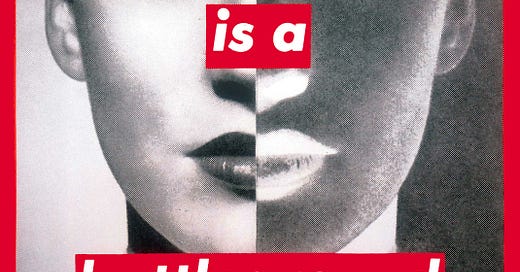Untitled (Your body is a battleground)
On View
Accession Date: 06/30/89
This is one of my favorite artist pieces ever. It’s part of the collection at The Broad (pronounced BRODE) in Los Angeles. Barbara Kruger’s work has been on exhibition in Chicago at the Art Institute of Chicago since September 19, 2021—an exhibition that will end in a few days on January 24, 2022. Another exhibition at the Los Angeles County Museum of Art—LACMA—is scheduled from Mar 20–Jul 17, 2022. I’m looking forward to the LACMA show and to seeing see this piece in person—finally!—at The Broad.
Here’s The Broad’s online text from “About This Artwork”:
Barbara Kruger addresses media and politics in their native tongue: tabloid, sensational, authoritative, and direct. Kruger’s words and images merge the commercial and art worlds; their critical resonance eviscerates cultural hierarchies — everyone and everything is for sale.
The year 1989 was marked by numerous demonstrations protesting a new wave of antiabortion laws chipping away at the 1973 Roe v. Wade Supreme Court decision. Untitled (Your body is a battleground) was produced by Kruger for the Women’s March on Washington in support of reproductive freedom. The woman’s face, disembodied, split in positive and negative exposures, and obscured by text, marks a stark divide. This image is simultaneously art and protest. Though its origin is tied to a specific moment, the power of the work lies in the timelessness of its declaration.
Timelessness indeed.
Here is an interesting one-minute-forty-five second audio recording from The Broad’s website about this piece.
“Your Body is a Battleground” is not just art sitting in a gallery: Even though the piece was inspired by a U.S. Women’s March in 1989, in 1991, a translated version of it was made for Poland, and 500 posters were distributed in Warsaw. According to The Art Newspaper, “the images only lasted one weekend before being torn down or covered up. Six months later, a Polish feminist group agreed to distribute the posters once more, pasting the works in hard-to-reach spots and ensuring the image became part of Polish history.” But apparently, with the right-wing government of Poland tightening its already strict abortion laws in the last couple of years, Kruger has recently allowed versions of this work to be displayed on the streets of Szczecin.
In an email, she told Artnet News:
It is both tragic and predictable that the brutal conditions that led to my producing this image so many decades ago are still at work controlling women’s bodies and their access to reproductive care. The structures of power and containment are relentless in their choreographies of marginalization and exclusion.

So not just timeless, but global.
Kruger ended with this glimmer:
In Poland, the gatekeepers, that tight twinning of the right-wing church and state, fight hard and dirty to keep their power and engage their fears. We see this echoed across continents in the reactionary responses to the broader struggles around gender, race, and class. In the midst of a planetary pandemic, these events loom large and present possibilities for a dire and cruel future, but also might suggest something braver, more hopeful, and just.
Braver. More Hopeful. Just.
I’ll say goodbye there.
Thanks for reading, viewing, listening.
Until next week!



